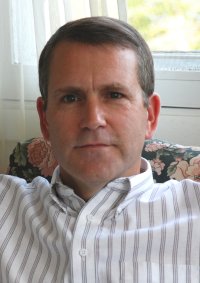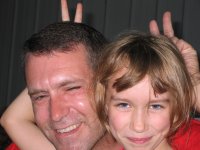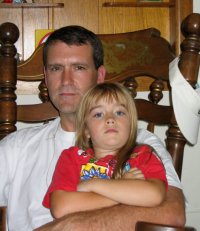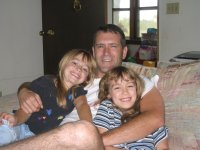 So here's the high level view: After high school, I went to college to
study computer science at The Big State University. I ran out
of money in my second year, and joined the U.S. Army to pay the bills.
Thanks to Uncle Sam, I was able to complete four years of a Bachelor's Degree
and two years of a Master's Degree. After that, even the Army wouldn't pay
for me to go to school, so I joined IBM Thomas J. Watson Research Center in
New York.
So here's the high level view: After high school, I went to college to
study computer science at The Big State University. I ran out
of money in my second year, and joined the U.S. Army to pay the bills.
Thanks to Uncle Sam, I was able to complete four years of a Bachelor's Degree
and two years of a Master's Degree. After that, even the Army wouldn't pay
for me to go to school, so I joined IBM Thomas J. Watson Research Center in
New York.
I worked in New York for three years on a project that allows blind people to use computers. It was funded by IBM in Austin, Texas, and after some questions came up about how the budgeted money was being spent, they asked me to come to Austin to complete the project. Away I went.
There's an interesting story about working in Austin. It's in intricate story of how I was hired as a contractor, but was only allowed to work if I used a particular agency to do my billing for me. The agency in question was actually a pet sitting business owned by the personal friend of someone who worked at IBM. After a year in Austin, I discovered that quite a bit of money had been embezzled from me. My contract was cancelled.
Regarding the project, the work I was doing would have provided access to Unix workstations for people who are blind. When I left IBM in Austin it was working. After I left, IBM shelved the project. It was the first time anyone had ever done anything like that. As of today, it's been 13 years and nobody has ever duplicated the work.
With a slightly sour taste in my mouth, I came home. I moved back to the state capital. It seemed like a reasonable place to look for a job since it was centrally located. As it turns out, finding a job was tougher than I expected. Rather than continue waiting for a job, I created one. I opened my own company, and ran it for nine years.
 Running a small business is tough. I remember once in the early years, I
opened a kitchen cabinet, and every item there was the grocery store brand.
There weren't a lot of items in the cabinet, either. Times
were tough, but eventually things turned around, the business did well, and
I did well. Times were good.
Running a small business is tough. I remember once in the early years, I
opened a kitchen cabinet, and every item there was the grocery store brand.
There weren't a lot of items in the cabinet, either. Times
were tough, but eventually things turned around, the business did well, and
I did well. Times were good.
![]()
I got to a point in my life were I looked back on what I did and asked myself how much good I had done. (Despite the brief thumbnail sketch above, I've actually done a remarkable number of things and worked on a lot of interesting projects.) I decided to go back to school and check out a career in the medical field.
I joined the only medical school in the state to explore a new direction in life. Honestly, I loved it. I was afraid that I might be too old to learn, but that wasn't the case. Nevertheless, after a couple years in medical school, I decided that I was too old to spend all the money I had, only to start over again completely broke in a field where I would be 20 years older than my peers. Additionally, I had the opportunity to work with the students doing their residencies and a lot of the recently graduated doctors. The stories they told about being a doctor in America were disheartening. I talked to an obstetrician (my field of interest) who said she still owed almost a quarter of a million dollars in loans, and her yearly malpractice insurance alone carried a six-digit price tag. I decided to look for something different.
 I did a search on the web for some particular computer hardware that I had
worked with. There aren't a lot of people who have expertise with it, and
I was one of the few. There were a couple of jobs that came up. One was
with IBM, so I sent my resume in with a nice cover letter. I never heard
back from them. It's interesting to note that a few years ago, you always
got a rejection letter from a company who wasn't interested in you. Now,
they just ignore you. After a couple of months, I sent my resume to the
second place. It was Oak Ridge National Laboratory, in East Tennessee.
I did a search on the web for some particular computer hardware that I had
worked with. There aren't a lot of people who have expertise with it, and
I was one of the few. There were a couple of jobs that came up. One was
with IBM, so I sent my resume in with a nice cover letter. I never heard
back from them. It's interesting to note that a few years ago, you always
got a rejection letter from a company who wasn't interested in you. Now,
they just ignore you. After a couple of months, I sent my resume to the
second place. It was Oak Ridge National Laboratory, in East Tennessee.
Getting hired at ORNL was an experience in itself (a story for another time), but I interviewed and was hired as research staff. I spent five years working at ORNL as a Research Scientist, and there are certainly some interesting stories to tell about those days, but (again) they'll have to wait for another time.
At ORNL I was working in High Performance Computing, the HPC field as we affectionatley call it. It's a research field, and it's very political. Of course, any time you're dealing with tens of millions of dollars in single purchases, things get political. Nevertheless, it was a decent job and gave me the opporunity to work with some of the smartest people in the world. That's always fun, even if it's a bit humbling at times.
Part of working in a highly political environment is keeping up with what your competition is doing. In this case, our competition was other research facilities, both national (federally funded) laboratories as well as many of the larger universities. One of the ways to keep up with what they're doing is to watch the job postings, so I received weekly listings of all the jobs in the HPC field, and browsed through them to see who was doing what.
 In late 2007, an oddball job posting came in my weekly email. It was near
the bottom of the listings, and it was for a new research facility in
Japan. The focus of the research was primarily biological sciences (which
I've always had an interest in), and the primary language for the facility
would be English. I had visited Japan for the first time a few years ago
and fell in love with the country, so this was a job opportunity I just
couldn't pass up. I applied for the position, interviewed, and moved to
Okinawa, Japan in January of 2008.
In late 2007, an oddball job posting came in my weekly email. It was near
the bottom of the listings, and it was for a new research facility in
Japan. The focus of the research was primarily biological sciences (which
I've always had an interest in), and the primary language for the facility
would be English. I had visited Japan for the first time a few years ago
and fell in love with the country, so this was a job opportunity I just
couldn't pass up. I applied for the position, interviewed, and moved to
Okinawa, Japan in January of 2008.
And here I am! Home in Japan. Working for a brand new facility that's
still getting started is a significant challenge. Sometimes (in fact
often) I wonder if I made the right decision. If I had stayed at ORNL I
could have retired six years from now, but I think early retirement is
safely out of the question now. Nevertheless, no matter how frustrated I
get, I can always sit back for a moment and think "I'm living in Japan!"
and it makes me happy again.
![]()